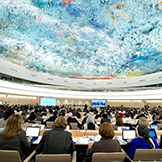UN Human Rights Council 35th session (6 – 23 June 2017)
Interactive Dialogue with the Commission of Inquiry on Burundi
Statement by Ireland
15 June 2017
Ireland aligns itself with the statement delivered on behalf of the European Union and adds the following.
Mr President
Ireland thanks the members of the Commission of Inquiry for their oral update, and their work in gathering information and evidence on the human rights situation in Burundi.
Ireland remains deeply concerned at the ongoing human rights violations in Burundi. There continue to be cases of arbitrary detention and disappearances, along with a worrying increase in intimidation and incitement to hatred by the youth militia, the Imbonerakure. We call on the Government to ensure that all Burundians are protected from these attacks, and to end the culture of impunity that prevails by prosecuting such incidents.
Ireland notes the difficult situation of those displaced within and outside Burundi due to the ongoing repression and threat of violence. We commend the ongoing willingness of neighbouring countries to host large refugee populations, and provide protection to those fleeing persecution.
We recall that, as a member of the Human Rights Council, Burundi is required to cooperate fully with the Council and its mechanisms. We strongly urge the Government to meet its obligations in this regard and to cooperate fully with all relevant international human rights mechanisms, including the Office of the High Commissioner for Human Rights, AU human rights’ monitors, and the UN Commission of Inquiry.
It is over two years since the current crisis began, and there appears to be little sign of progress. Ireland remains supportive of the ongoing EAC mediation process, and calls on the Government to engage meaningfully in future talks, without preconditions and with a genuine effort to reach agreement. We also reaffirm the critical importance of the Arusha Accords to upholding peace and stability in Central Africa, and call on Burundi and neighbouring countries to ensure there are no constitutional changes within Burundi that would undermine the Accords.
The influx of refugees to neighbouring countries has reduced somewhat in recent months, which some claim is due to a deterioration in freedom of movement within Burundi and changes in how refugee policy is interpreted in some neighbouring countries. Based on your interviews and meetings in recent months, have you been able to assess whether there is any significant change in the restriction of movement of people reaching and crossing the Burundian border to neighbouring countries?
Thank you.

